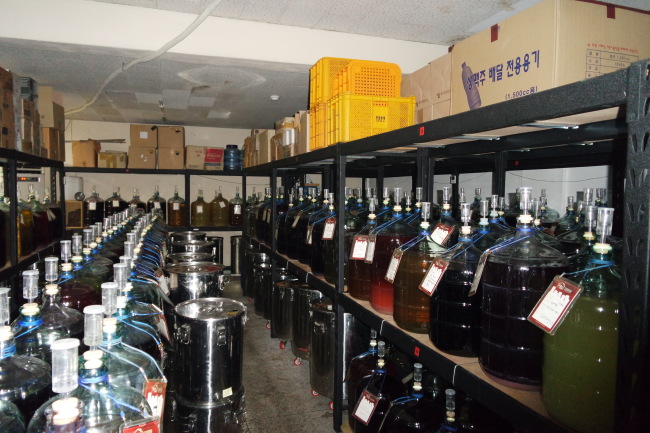Beer has not seen a solid footing in Korea over the past few years.
Its market has been largely controlled by local titans, and the drink was largely seen by the public as nothing more than an ingredient for making the wildly popular “somaek” (beer with soju). When a 2012 Economist article claimed South Korean beers to be worse than those in North Korea, the hard truth was that they could not counter it.
“I saw on TV that Japan had over 2,000 kinds of beer, like makgeolli (Korean traditional drink) in Korea. This made me wonder: Why don’t we?” said 39-year-old salesman Lee Hyun-su, who took up the hobby of making his own beer to share with his friends and clients at work.
Riding the recent wave in craft beer, disgruntled South Koreans like Lee are now stepping up to brew their own brands.
One step into “Soma,” a home brewing studio in Oksu-dong, Seoul, is enough to provide a sneak peak at the recent trend of DIY brewing. The underground workshop is filled with smells of boiling barley, hops and berries for wine-makers.
At a table set in the side of the workshop, Lee is occupied with grinding coriander seed with a soju bottle.
For him, home brewing is not just about making delicious beer, but also about the experience.
 |
| Containers holding beer, wine and traditional Korean drinks (Courtesy of Soma) |
“It can be one of the things that I can talk about with my clients. When I tell them I make my own beer, they become interested. It’s an effective way to leave an impression,” he said.
Lee is not alone in his newfound love for making his own beer. He is part of the home-brewing online club “Making beer,” whose members get together to share their rare hobbies.
“We share information and know-how about brewing. We even have a regular competition amongst ourselves. The grand prize is about 1 million won ($910) but it’s not about the money; it’s about having fun,” Lee said.
But brewing beer is hardly a stroll in the park, taking at least three to seven hours just to boil, depending on whether or not ready-made ingredients are used. Time constraints and the strong smell of hop and barley makes it hard for DIY-brewers to brew their concoctions at home.
“Some people have the skills, tools and ingredients to make it at home, but the smell is what usually draws the line for most people,” said Kim Sung-jun who runs Soma. “They say (the ingredients) get sticky and clean-up is a nightmare.”
This is why Lee and his buddies often gather at the studio to get on with their brewing.
At the center of the workshop are others like Lee, pouring barley into the bucket.
According to Kim, each batch of barley shows different colors depending on the heat and pressure applied to them, which all result in different smells and flavors.
The entire process costs users about 50,000 won for ale and 60,000 won for lager, which has to be ripened at a refrigerated temperature of around 10 degrees Celsius. The ale is ripened at about 18 degrees Celsius, which is approximately the room temperature of the workshop.
“The fee pays for the bottle, sugar, water, gas, tools and the workshop. But sometimes companies pay for classes for their staff as part of their welfare program. In that case, I would charge extra.”
After the liquid has been boiled for hours, they are stored in containers for seven to 10 days for fermentation. They are then stored for another three weeks for maturing.
People seeking to learn how to brew beer for themselves can also find help at Susubori Academy, a brewing school run by professor Jo Hyo-jin of Kyunggi University.
“Our students vary; from college freshmen to couples, senior citizens, office workers, those starting to start their own business and even business owners,” said Lee Ji-a of Susubori.
Its biggest merit is its teachers, Lee said, which include owners of famous craft beer places around Seoul such as Magpie Brewery and Reilly’s Taphouse.
“Students are encouraged to try new things, such as blending beers with traditional Korean alcohol and distilling beer to make whiskey,” she explained.
Those looking to dig deeper can apply for a brewing license, certified by the Institute of Brewing and Distilling. Susubori was recently designated as an official testing site of the IBD.
But license and classes aside, the focus of the home brewers is to have fun with their peculiar hobby.
“It may not be quite as good as ones made by professionals, but it is more fun than you might think. People are amazed by the fact that they can make their own beer, which is what draws people in,” said Kim.
By Yoon Min-sik (minsikyoon@heraldcorp.com)



